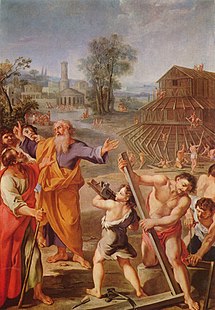| Cheshvan | |
|---|---|
 The Great Flood, which according to the Bible wiped out the world, started in Marcheshvan. | |
| Native name | מַרְחֶשְׁוָן (Hebrew) |
| Calendar | Hebrew calendar |
| Month number | 8 |
| Number of days | 29 or 30 |
| Season | Autumn (Northern Hemisphere) |
| Gregorian equivalent | October–November |
Marcheshvan (Hebrew: מַרְחֶשְׁוָן, Standard Marḥešvan, Tiberian Marḥešwān; from Akkadian waraḫsamnu, literally, 'eighth month'), sometimes shortened to Cheshvan (חֶשְׁוָן, Standard Ḥešvan Tiberian Ḥešwān), is the second month of the civil year (which starts on 1 Tishrei), and the eighth month of the ecclesiastical year (which starts on 1 Nisan) on the Hebrew calendar.
In a regular (kesidran) year, Marcheshvan has 29 days, but because of the Rosh Hashanah postponement rules, in some years, an additional day is added to Marcheshvan to make the year a "full" (maleh) year. Marcheshvan occurs in October–November in the Gregorian calendar.
The Hebrew Bible, before the Babylonian Exile, refers to the month as Bul (1 Kings 6:38). In Sidon, the reference to Bul is also made on the Sarcophagus of Eshmunazar II dated to the early 5th century BC.